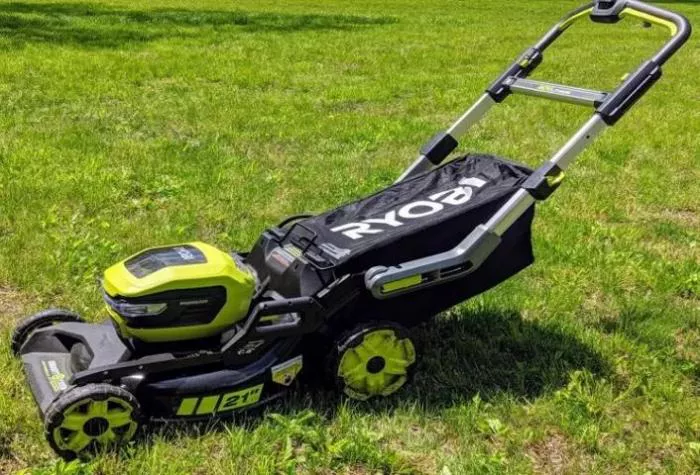Ryobi lawn mowers are popular for their reliability, ease of use, and innovative features. Whether you own a gas-powered, electric, or battery-operated Ryobi mower, proper operation ensures efficiency and longevity. This guide provides step-by-step instructions on how to operate a Ryobi lawn mower safely and effectively.
Understanding Your Ryobi Lawn Mower
Before operating your Ryobi mower, familiarize yourself with its components. Ryobi offers different models, including corded electric, cordless battery-powered, and gas mowers.
Key components of a Ryobi lawn mower
- The deck houses the cutting blade and protects the user from debris.
- The handle adjusts for user comfort and often includes controls.
- The power source varies: gas engines, lithium-ion batteries, or electric cords.
- The cutting height lever allows adjustment for different grass lengths.
- The grass bag or mulching plug collects or redistributes clippings.
Knowing these parts ensures smoother operation and better maintenance.
Safety Precautions Before Operating
Safety should always come first when using a lawn mower. Follow these guidelines to prevent accidents.
Wear appropriate clothing
Long pants, closed-toe shoes, and safety goggles protect against flying debris. Avoid loose clothing that could get caught in moving parts.
Inspect the mowing area
Remove rocks, sticks, toys, and other obstacles that could damage the mower or become dangerous projectiles.
Check the mower condition
Ensure the blade is sharp and securely attached. Verify that all nuts and bolts are tight. For battery models, confirm the battery is fully charged. For gas mowers, check oil and fuel levels.
Operate in proper weather conditions
Avoid mowing wet grass to prevent slipping and clogging the mower deck.
Following these precautions minimizes risks and enhances performance.
Starting Your Ryobi Lawn Mower
The starting process varies depending on the mower type. Below are instructions for each model.
Starting a Ryobi Electric Corded Mower
- Plug the mower into a grounded outdoor outlet.
- Press the safety button on the handle.
- Squeeze the lever to start the mower.
- Release the lever to stop the motor.
Starting a Ryobi Battery-Powered Mower
- Insert a fully charged battery into the designated slot.
- Press the safety button and hold the start lever.
- The mower will start immediately.
- Release the lever to power off.
Starting a Ryobi Gas-Powered Mower
- Check the oil and fuel levels before starting.
- Prime the engine by pressing the primer bulb several times.
- Set the throttle to the “Start” position.
- Pull the starter cord firmly until the engine starts.
- Allow the engine to warm up before mowing.
Proper starting techniques ensure smooth operation and reduce wear on the mower.
Adjusting the Cutting Height
Ryobi mowers allow height adjustments to suit different grass types and lawn conditions.
- Locate the cutting height lever near the wheels.
- Choose the desired setting (usually between 1 to 4 inches).
- Ensure all wheels are set to the same height for an even cut.
Taller grass benefits from a higher setting, while shorter grass requires a lower cut. Adjusting the height prevents scalping and promotes healthier turf.
Mowing Techniques for Best Results
Proper mowing techniques improve lawn health and mower efficiency.
Mow in straight lines: Overlapping slightly ensures even coverage.
Alternate mowing patterns: Changing directions prevents soil compaction and grass bending.
Avoid cutting too short: Removing more than one-third of grass height stresses the lawn.
Keep the blade sharp: A dull blade tears grass, leading to brown tips and disease.
Following these techniques enhances lawn appearance and mower performance.
Handling Grass Clippings
Ryobi mowers offer multiple ways to manage grass clippings.
Bagging: Attach the grass bag for a clean finish. Empty it frequently to prevent clogging.
Mulching: Use the mulching plug to return nutrients to the soil.
Side discharge: Ideal for tall grass, but requires raking afterward.
Choosing the right method depends on lawn conditions and personal preference.
Maintaining Your Ryobi Lawn Mower
Regular maintenance extends the mower’s lifespan and ensures optimal performance.
Clean after each use: Remove grass clippings and debris from the deck.
Check the blade: Sharpen or replace it if damaged.
Inspect the air filter (gas models): Clean or replace it as needed.
Store properly: Keep the mower in a dry place, and for battery models, store batteries at room temperature.
Proper maintenance prevents breakdowns and costly repairs.
Troubleshooting Common Issues
Even well-maintained mowers may encounter problems. Here are common issues and solutions.
Mower won’t start: Check the power source (battery, cord, or fuel). Ensure safety features are engaged.
Uneven cutting: Verify the cutting height settings and blade sharpness.
Excessive vibration: Inspect the blade for damage or imbalance.
Poor battery life (cordless models): Use only Ryobi-approved batteries and avoid extreme temperatures.
Addressing issues promptly keeps the mower running smoothly.
Storing Your Ryobi Lawn Mower
Proper storage prevents damage and prepares the mower for the next use.
For gas models: Drain the fuel or add a stabilizer before long-term storage.
For battery models: Remove the battery and store it separately.
Clean thoroughly: Remove all grass and dirt to prevent corrosion.
Cover the mower: Use a protective cover to shield it from dust and moisture.
Correct storage practices ensure readiness for the next mowing season.
Conclusion
Operating a Ryobi lawn mower correctly improves efficiency, safety, and lawn health. By understanding its components, following safety measures, and performing regular maintenance, users can enjoy a well-kept lawn for years. Whether using an electric, battery-powered, or gas model, proper techniques and care maximize performance. Always refer to the user manual for model-specific instructions and enjoy a hassle-free mowing experience.
This guide covers essential steps to operate a Ryobi lawn mower effectively. With these tips, maintaining a beautiful lawn becomes simple and efficient.
Related topics:

